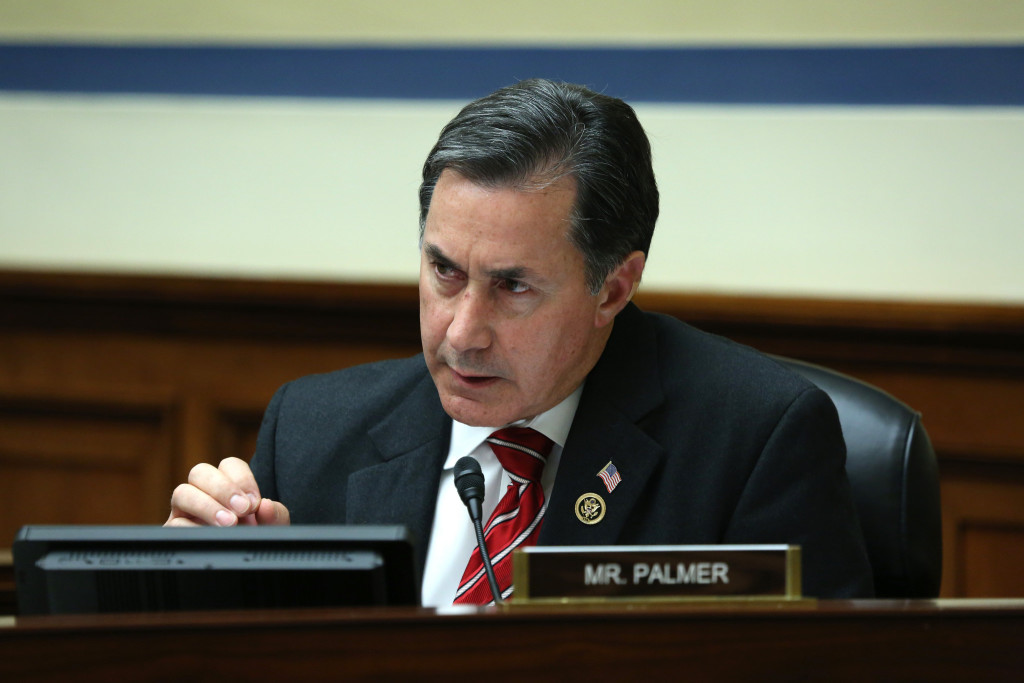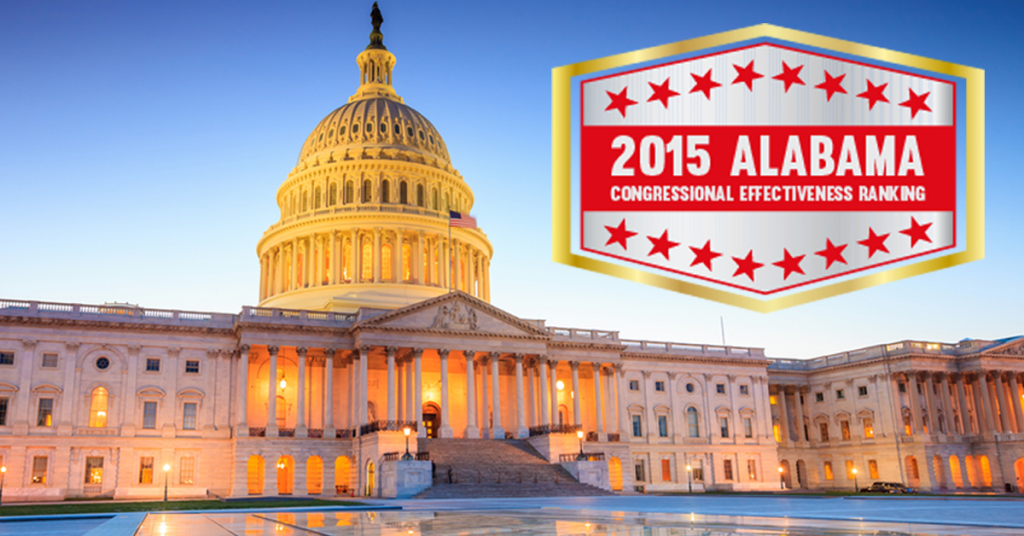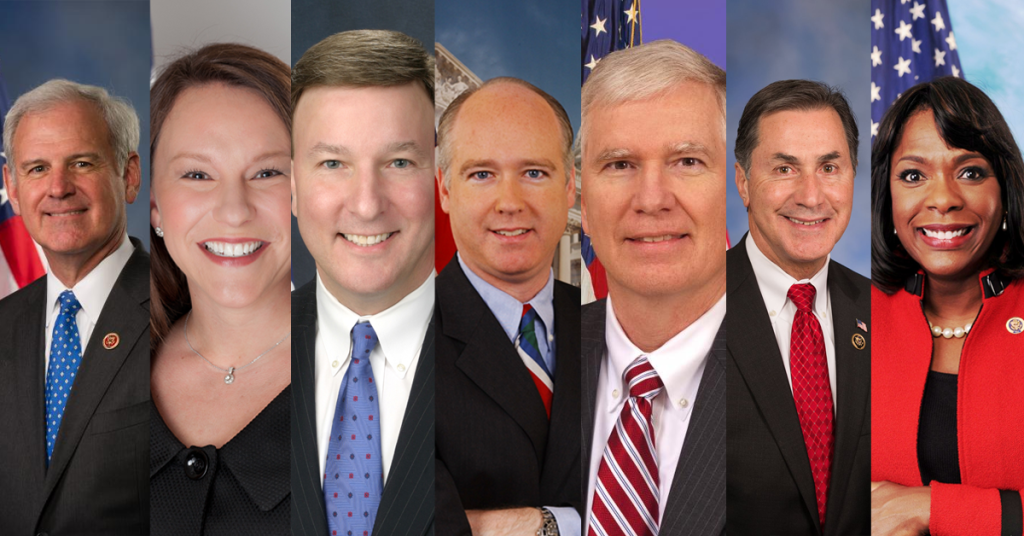Bradley Byrne: Fighting fraud, abuse

The federal government is huge. In fact, there are over 275 executive agencies, departments, and boards that employ over two million people. With a bureaucracy this size, it should come as no surprise that fraud and abuse is far too common. Since coming to Washington, one of my top priorities has been to reduce the overall size of the federal government and to cut waste and abuse. I took a step in the right direction earlier this year when I introduced the Sunset Act. My bill, known as the Sunset Inefficient and Unaccountable Government Act, would require all federal agencies to be reviewed and renewed by Congress once every ten years. If an agency failed to be renewed, it would go out of existence. Many in Washington were outraged by my idea because it challenged the status quo. Trust me, there is a lot of resistance when you try to push back against the Washington machine, but I have also heard a lot of positive support for my bill from conservative colleagues and those who support a smaller, more efficient federal government. In addition to pushing for large-scale reforms to the way the federal government operates, I am also committed to looking for targeted changes that will help cut down on abuse and waste. Recently, I saw a local news report on Local 15 News in Mobile about over-income families living in taxpayer funded public housing. After looking into the story, it turns out that 25,226 over-income families nationwide live in public housing. Right here in Alabama, there are 812 cases of over-income residents living in public housing, which ranks fourth highest in the United States. In fact, there is an individual living in public housing in Mobile who makes over $100,000 a year. That is astonishing. So I set out to learn more about how our public housing programs work. It turns out that families living in public housing are already required to go through yearly income verification checks, but those who are found to be over-income are not required to move out of their taxpayer funded homes or apartments. This is unacceptable and a waste of taxpayer money, so I went to work on legislation that would help make this right. A few weeks ago, I introduced H.R. 4133, the Public Housing Accountability Act. My bill would establish that any family found to be over-income must vacate public housing within 30 days. I want to make it clear that I understand the important role public housing plays for many of our nation’s poorest families, but allowing this kind of blatant fraud and abuse is a disservice to those who need truly need public housing. In fact, the Department of Housing and Urban Development Inspector General found that there are thousands of families across the United States on a wait list for public housing while these individuals take up space. For example, in the New York City Housing Authority, there are at least 10,000 over-income families living in public housing while over 300,000 families are on a waiting list. Tackling abuse in public housing is just a starting point. From food stamps to Medicaid, fraud is far too common in our nation’s welfare programs. I believe we need to entirely rethink the way our welfare programs work to ensure we are actually helping people get out of poverty instead of incentivizing them to stay there. At the end of the day, there is far too much fraud and abuse within the federal government. It is time Congress gets serious about reforming government to ensure it is both efficient and effective. Bradley Byrne is a member of the U.S. Congress representing Alabama’s 1st Congressional District.
No consensus about legality of Donald Trump’s idea of Muslim ban

There’s no legal or historical precedent for closing U.S. borders to the world’s 1.6 billion Muslims, but neither is there any Supreme Court case that clearly prevents a president or Congress from doing so. Legal experts are divided over how the high court would react to Republican presidential candidate Donald Trump‘s call for a temporary halt to Muslims entering the United States. “The court has never been faced with a challenge against a whole religion. I think that would raise interesting and novel questions for the court,” said Stephen Yale-Loehr, who teaches immigration law at Cornell University’s law school. Any such blanket action based on a person’s religion would be unconstitutional if applied to U.S. citizens, scholars agree. But courts have given Congress and the president wide discretion when it comes to immigration. “I don’t actually think it would be unconstitutional. The president has a huge amount of discretion under the immigration statute,” said Eric Posner, a constitutional law professor at the University of Chicago. The same protections given citizens do not apply to people who are neither American nor in the United States, Posner said. Courts have upheld the denial of visas to enter the country to Marxists and people born to parents who were not married, among many categories. The Supreme Court has never struck down an immigration classification on the basis of race or any other reason, said Temple University immigration expert Peter Spiro. Other scholars offer a different take. They say the court would not grant the president a blank check and would instead rely on constitutional provisions that protect religious freedom and prohibit discrimination to strike down a ban on Muslim visitors to the United States. “Imagine that instead of banning Muslims, we banned blacks from any country,” said Vanderbilt University’s Suzanna Sherry, describing a hypothetical reaction to a period of intense racial unrest in the United States. “If you’re black, you can’t come into the country. … I don’t think a court today would ever hold that constitutional,” Sherry said. Sherry acknowledged that she cannot cite any case involving immigration to support her view, and that a Supreme Court decision to uphold bans on Chinese laborers in the late 1800s points in Trump’s favor. “But developments in discrimination law and First Amendment law suggest that the court would not today uphold an exclusion on the basis of religion,” she said. The Supreme Court also upheld the internment of Japanese-Americans during World War II. Both the anti-Chinese laws and the internment camps now are widely seen as shameful episodes in American history. But no less an authority than Supreme Court Justice Antonin Scalia has said it is naive to think the country would never again resort to such harsh measures, particularly during wartime. “That’s what was going on – the panic about the war and the invasion of the Pacific and whatnot. That’s what happens,” Scalia said on a visit to Hawaii in 2014, describing the mood in America following Pearl Harbor that led to the internment camps. “It was wrong, but I would not be surprised to see it happen again, in time of war. It’s no justification, but it is the reality.” Predictions about how the court might rule do not matter as much as public reaction at the moment. While 58 percent of Americans oppose a temporary ban on Muslim visitors in a CBS News poll, Trump’s proposal finds much more favorable reaction from Republicans. Fifty-four percent Republicans support the ban, the poll found. Trump has remained at the head of the Republican field for months, and his tough words about Muslims may be tapping into fears among Republican voters about immigrants from the Middle East. His proposal to keep Muslims from entering the United States followed the Dec. 2 shootings in San Bernardino, California, that left 14 dead and 21 wounded. Tashfeen Malik, a Muslim from Pakistan who with her husband was killed by police in a gun battle after the rampage, entered the country on a fiancee visa that is issued abroad to people who plan to marry American citizens, authorities have said. Last year, Malik married the other suspect in the shooting, U.S. citizen Syed Rizwan Farook. Trump said he would prevent Muslims from entering the United States “until our country’s representatives can figure out what the hell is going on.” Trump’s proposal turns traditional ideas about the United States as a beacon for political and religious refugees upside down, said Mary Meg McCarthy, executive director of the National Immigrant Justice Center in Chicago. “In all honesty, I never in my whole entire life thought that we’d be fighting for the human and due process rights of refugees,” including many who have fled religious persecution, McCarthy said. Efforts to halt the flow of refugees risks disturbing the balance “our commitment to fairness and refugee protection with our national security interests,” she said. Republished with permission of the Associated Press.
U.S. Reps. Terri Sewell, Ed Royce push to remove barriers to homeownership

Alabama U.S. Rep. Terri Sewell (AL-07) reached across the aisle Thursday to California U.S. Rep. Ed Royce (CA-40) in efforts to remove barriers to homeownership. The two – both members of the House Financial Services Committee – introduced, H.R. 4211, the Credit Score Competition Act of 2015, which allows the Government-Sponsored Enterprises (GSE) Fannie Mae and Freddie Mac to consider alternate credit scoring models when making mortgage lending decisions. “Fannie Mae and Freddie Mac are the largest mortgage purchasers in the nation, but they rely on credit score models that don’t necessarily take into account something as simple as whether borrowers have paid their rent on time,” Sewell said. “Home ownership is an integral part of the American Dream that shouldn’t be out of the reach for low-income, rural, and minority borrowers who lack access to traditional forms of credit. This legislation takes an important step towards addressing this issue and helps make homeownership a reality for more Americans across the country.” Fannie Mae and Freddie Mac currently evaluate their ability to purchase a mortgage based exclusively on a consumer’s FICO credit score. FICO scores are based on models and data from 1995 to 2000 that unnecessarily excludes millions of qualified borrowers. “The Credit Score Competition Act of 2015 allows Fannie Mae and Freddie Mac to consider modern and updated credit scoring models that give more creditworthy buyers access to affordable, home mortgages,” Sewell said. “It is my hope that this critically important legislation will help make homeownership a reality for many of the hard-working men and women living in Alabama’s 7th Congressional District.” The legislation will act to establish and preserve a competitive credit scoring marketplace by eliminating the Fannie and Freddie FICO monopoly and will foster innovation in the field and more affordable credit score products for consumers. “Breaking up the credit score monopoly at Fannie and Freddie will assist them in managing their credit risk and avoiding the need for another taxpayer bailout,” Royce said. “The GSEs’ use of a single credit score stifles innovation and affordability in the credit scoring field and bars millions of qualified homebuyers from purchasing a home.”
Martha Roby, Richard Shelby take opposing views on education reform bill

Last week, with Rep. Martha Roby‘s (AL-02) support, the U.S. House of Representatives overwhelmingly voted to scale back the federal government’s role in American education by passing the Every Student Succeeds Act. The bill, approved 359-64, replaces the 2002 No Child Left Behind law and hands over much of the decision-making power back to states and school districts across the country, while simultaneously ending federal efforts to encourage academic standards such as Common Core guidelines. The legislation would however retain the testing requirements, which many parents, teachers and school districts detest. Though it reforms the process and now grants the states the decision-making power over how to use the test results in assessing teachers and schools. “This is a big win for parents, teachers, administrators and anyone who has been frustrated by the federal intrusion in education policy,” explained Roby. “It isn’t just important for the current issues we know about. It’s also important for the next pet policy the Secretary of Education favors. Maybe that’s next year or five years from now, but I want to take away their ability to improperly coerce states once and for all, and that’s what my language does.” But not all Alabama lawmakers share Roby’s positive thoughts of the legislation. While U.S. Senator Richard Shelby (R-AL) took a stand against the legislation prior to the U.S. Senate‘s Wednesday vote. “While this bill may be well-intentioned and makes some improvements to our current policy, it is a missed opportunity to truly put an end to unnecessary federal intervention into education,” said Richard Shelby. “I have always believed that education decisions should be made at a local level and that Congress should empower parents and teachers – not Washington bureaucrats. Instead, this bill extends some of the same failed policies that could provide a path for top-down federal mandates like Common Core.” Shelby isn’t the only one who disapproves of the pending legislation. Roby’s primary challenger, Wetumpka Tea Party President Becky Gerritson calls Roby’s support of the bill a “headscratcher.” “[Roby’s] vote yesterday is yet another example of her support for Common Core, for top-down one-size-fits-all standards, for psychological profiling of our young students, and for the federal government dictating what goes on in our classroom,” Gerritson said in an email to her supporters. “I don’t know if Martha Roby agreed with every portion of this bill or if she was just doing what she was told by fellow members of the Establishment. What I do know is that this is yet another example of Martha leaving the values of the Second District at home. When Martha Roby goes to DC, her every action supports making government bigger, more unconstitutional, and more intrusive.” But not everyone in the 2nd Congressional District shares Gerritson’s concerns. Roby put out a press release Wednesday citing the support and approval of several district educators, including Dothan City Schools Superintendent Chuck Ledbetter, Ed. D. “While it isn’t perfect, it is does return more of the education policy making role to the states and local school boards,” assures Ledbetter. “It continues to emphasize education equity for all students while giving back control of how equity and excellence are achieved to those closer to the students who can make better, individualized decisions to help students learn. We appreciate Rep. Roby’s help in curtailing federal overreach and her willingness to support this important education bill.” The Senate approved the legislation Wednesday, 85-12 with the support of Sen. Jeff Sessions (R-AL), and it is now on its way to President Barack Obama‘s desk to be signed into law.
Gary Palmer stands up for coal miners in committee hearing

Congressman Gary Palmer (AL-06), a member of the Oversight and Government Reform Subcommittee on Interior, attended a hearing Tuesday on the Department of the Interior’s (DOI) recently proposed Stream Protection Rule and took a stand against it citing how it would affect Alabama coal miners. Palmer claims the rule, which regulates surface coal mining operations in and near streams, would have significant negative effects on energy production. “Coal Miners are not made-up stats, they are real people,” Palmer said. “The DOI needs to come to Alabama and talk to some of the coal mining families, particularly the kids, who are facing the prospect of Christmas with no presents; or young people who are withdrawing from college. Instead, the Department of the Interior has frozen out states and industry in the rule-making process.” The original version of the rule, passed in 1979, created a buffer zone around year-round streams near mining operations. According to Palmer, the new, more stringent rule would have significant negative economic effects. Estimates say it could cost up to 280,000 Americans their jobs. You can watch Congressman Palmer’s questions at the hearing below:
Martha Roby: Patience pays off in defending state authority over education

Progress takes patience sometimes, I suppose. Two-and-a-half years ago, I introduced the “Defending State Authority Over Education Act” to stop once and for all the inappropriate federal coercion of states into adopting the Obama Administration’s “pet” policies, standards or curricula, including Common Core. I strongly support local control of education, and I said then my true goal was to build support for getting my “State Authority” language included in the overall rewrite of the badly-flawed “No Child Left Behind” law, which Congress has been working on for years. Initially we had success in the House, but the Democratic Senate wouldn’t touch it. With a change in Senate leadership after the last election, this year looked much more promising. We kept pushing and, this week, I’m pleased to confirm the good news: at long last, the final bill replacing “No Child Left Behind” does include our “State Authority” language strictly prohibiting the federal Department of Education from using funding grants, rule waivers or other means to coerce states or local boards in education decisions. This is a big win for parents, teachers, administrators and anyone who has been frustrated by the federal intrusion in education policy. The “Every Student Succeeds Act” replaces the nation’s current law with policies that reflect a more conservative, state-driven approach to education. The bill: Places new, unprecedented restrictions on the U.S. Secretary of Education, including my “State Authority” language prohibiting the Secretary and his agents from using money and rule waivers to coerce policy decisions; Eliminates the “Adequate Yearly Progress,” or “AYP” metric and return the responsibility for proficiency systems to the states where they belong; Eliminates or consolidates 49 ineffective, duplicative, and unnecessary programs, replacing them with the simple grants that providing states and school districts with more flexibility; Supports the start-up, replication and expansion of high-quality public charter schools, which Alabama can now access to support its recently-enacted charter school program. Of course, I would prefer that the bill go much further in severing ties between federal and state governments in education, and voted to support amendments doing just that. However, it would be foolish to sacrifice all the many good, important gains made in this bill simply because it doesn’t have everything I want. The Wall Street Journal calls this bill “the largest devolution of federal control to the states in a quarter-century.” As someone who has long fought for a more conservative approach, that’s exciting. Yes, it took a lot of time and effort to build support for this idea. But, I’m proud to have kept fighting despite initial setbacks. And, I’ll be even prouder when our “Defending State Authority” language is finally part of the nation’s new, conservative education law. Martha Roby represents Alabama’s 2nd Congressional District. She lives in Montgomery, Alabama with her husband, Riley and their two children.
Speaker Ryan to House GOP: Donald Trump comments ‘not who we are’

Speaker Paul Ryan on Tuesday dismissed Republican presidential candidate Donald Trump‘s comments on Muslims, saying such views are “not what this party stands for and more importantly it’s not what this country stands for.” Speaking to reporters after a closed-door GOP caucus meeting, Ryan addressed Trump’s remarks – without mentioning his name. The speaker said he doesn’t normally comment on the presidential race but was making an exception. “Freedom of religion is a fundamental constitutional principle…This is not conservatism what was proposed yesterday, is not what this party stands for and more importantly it’s not what this country stands for,” Ryan said. The Wisconsin Republican said many Muslims served the country and work in Congress. He said the “vast, vast majority of them are peaceful.” Trump on Monday called for a “total and complete shutdown of Muslims entering the United States” in the wake of attacks at home and abroad. Trump’s proposed ban would apply to immigrants and visitors alike. Asked if he will support Trump if he’s the nominee, Ryan said he will support whomever the Republicans nominate for the presidency. In the closed-door session, Ryan urged the GOP rank and file to steer clear of Trump’s message. Rep. Tom Cole, R-Okla., said Ryan told Republicans “not to go down that road. That’s not who we are as a country or who we are as a party – that religious liberty is a fundamental American right and that we should never compromise on that front and that’s an inappropriate policy to pursue. He was very direct and very strong.” Republican Rep. Matt Salmon of Arizona told reporters that Ryan told the weekly closed-door meeting of the House GOP that Trump’s remarks violate at least two constitutional amendments. Republished with permission of the Associated Press.
This week in the U.S. House of Representatives: Dec. 7 – Dec. 11

The countdown is one — Congress has only a few days left to avert another government shutdown. Lawmakers have until Friday, December 11 to pass a massive, catchall spending bill called an omnibus that will fund the federal government until after the presidential election. Negotiators are aiming to release the text of the massive legislation on Monday. On Monday and Tuesday, the U.S. House of Representatives is in session and will consider two bills under suspension of the rules. Among those bills is: H.R. 158: the Visa Waiver Program Improvement Act, which prohibits individuals who have been to specified nations such as Syria and Iraq from entering the United States unless they are interviewed by U.S. officials and get a regular visa, even if they are from countries that participate in the Visa Waiver Program (which allows citizens from 38 countries to travel to the U.S. without a visa). Alabama co-sponsors: Rep. Bradley Byrne (AL-01); Rep. Robert Aderholt (AL-04) On the floor of the U.S. House of Representatives the remainder of the week: H.R. 2130: Red River Private Property Protection Act. The bill requires the Bureau of Land Management to sell roughly 30,000 acres of federal land along the Red River, which forms part of the border between Texas and Oklahoma, with current and adjacent property owners to have right of first refusal to purchase the land. Alabama co-sponsors: None FY16 Omnibus. The House may consider an omnibus appropriations legislation comprising all 12 regular appropriations bills that would fund the entire government for the remainder of FY 2016. Current funding expires on Friday, Dec. 11. Conference agreement on H.R. 644: a trade enforcement measure that passed each chamber earlier this year during consideration of other trade legislation, including the Trade Promotion Authority (TPA), that were eventually signed into law. H.R. 644 includes numerous provisions to facilitate trade and strengthen enforcement of U.S. trade laws, including U.S. intellectual property rights and anti-dumping and countervailing duty laws. Tax Extenders. House and Senate negotiators are reportedly close to reaching agreement on extending or retroactively renewing dozens of business and other tax provisions that are scheduled to soon expire or that expired at the end of 2014. Reconciliation. The House may consider the Senate amendment to H.R. 3762, the House-passed reconciliation measure that would repeal major portions of the Obamacare. As originally passed by the House in October, the measure repealed Obamacare’s individual and employer mandates, the medical device tax, the “Cadillac” tax on high-value employer health care plans, and the Prevention and Public Health Fund. It also defunded Planned Parenthood for one year. Last week, the Senate passed an amended version, by a 52-47 vote, which added provisions to limit the law’s expansion of Medicaid and repeal the tax subsidies for purchasing insurance on the state exchanges, as well as several other taxes under the law.
The Alabama delegation celebrates Thanksgiving

As Alabamians gather across the state to celebrate this truly American holiday of Thanksgiving, the Alabama Congressional delegation has taken to social media and email messages to spread the message of Thanksgiving and all that they’re thankful for. Here’s what they’re saying this Thanksgiving: U.S. Senator Jeff Sessions: On this Thanksgiving Day, let us give thanks to God for the blessings in our lives and reflect on our gratitude to the men and women who came before us and carved out this magnificent nation upon this beautiful continent. I wish all of you a special time with those dearest to you, and let us also keep in our hearts those brave souls serving under our flag in distant lands far away from family and home. God bless, and happy Thanksgiving to one and all. U.S. Rep. Bradley Bryne (AL-01): With all the negative things going on in the world today, it would be easy to lose site of all the blessings in our lives. Personally, I am thankful for my loving wife, four children, grandson, and entire family. They bring so much joy and happiness to my life. I am thankful to live in such a beautiful part of the country with truly amazing friends and neighbors who would do anything for one another. I am thankful for our local churches and charity organizations who go out of their way to support and provide for those who are less fortunate during the holidays. I am thankful for the men and women who serve in the United States military to help keep our nation safe and secure. I am equally thankful for our veterans who have devoted and sacrificed so much in defense of the freedoms we hold dear. I am thankful to live in the greatest country on the face of the earth where every person, regardless of their background, has the opportunity to achieve the American dream. Finally, I am thankful for an all-loving God through whom all blessings flow. U.S. Rep. Martha Roby (AL-02): I hope you and your family are having a wonderful Thanksgiving. This is such a special holiday to me because it is a time when we as a nation take time to pause from our hectic schedules and thank God for all that he has blessed us with. As we gather with family and friends, let’s all take time to count our many blessings. I’m thankful for the blessing of family; for my husband, Riley and our two children, Margaret and George; for my parents; for my sweet grandmother and all of our dear family and friends. I’m thankful for the blessing of freedom, to live in the United States and for the rights we enjoy as Americans. I’m keenly aware that we only have those rights and freedoms because brave Americans were willing to fight for them, and I’m so grateful for those who have served in uniform to protect our nation, our communities and our families. As you know, many military personnel are serving right now in faraway places where they can’t be with their families. I hope you’ll join me in taking a moment to remember them and say a special prayer of protection. U.S. Rep. Robert Aderholt (AL-04): I hope and pray that all of you have a blessed Thanksgiving. I also hope that you will take time to truly give thanks to God for the blessings we all have. U.S. Rep. Mo Brooks (AL-05): Today we pause to reflect on everything for which we are truly grateful. Wishing you and yours a happy and safe Thanksgiving! U.S. Rep. Gary Palmer (AL-06): Happy Thanksgiving to all! U.S. Rep. Terri Sewell (AL-07) “Let gratitude be the pillow upon which you kneel to say your nightly prayer. And let faith be the bridge you build to overcome evil and welcome good.” — Maya Angelou
Pass or fail: The surprising rankings of our congressional delegation

According to a November Gallup poll, public approval of Congress has fallen to its lowest approval rating this year, just two percentage points higher than its all-time low — sitting at an abysmal 11%. Which is why Alabama Today decided it was a good time to see whether or not Alabama lawmakers are actually “earning” their low approval ratings or if the American public has simply had its fill of partisan politics, with our first Congressional Effectiveness Ranking. The results? A mixed bag. In a red state we certainly would not have guessed the #1. In theory, all members of Congress work hard, but as a whole Alabama lawmakers don’t have much to show for 2015. Only one member — Alabama’s sole Democrat in Congress, Terri Sewell — has even seen a bill become law, proving the point you do not need to be in the majority party to be an effective lawmaker. The effectiveness score is simple – take the percentage of bills/amendments sponsored by each lawmaker over the number that went on to pass committee. Should Members tie, a higher-weight is given to any bills that pass the floor or become law. While most of Alabama’s representatives are electorally safe heading into next fall’s elections, voters do not always consider just how effective the incumbent members are. Here’s how the Alabama delegation ranks from most-effective to least-effective members of Congress. See where your representative ranks on the list: #1 U.S. Rep. Terri Sewell (AL-07) Effectiveness Score: 63% Total Sponsored Bills/Amendments: 8 Bills Passed Committee: 5 Serving Since: 2011 Legislation/amendments sponsored in the 114th Congress: H.Amdt.832 to H.R.1737 Most recent action: Agreed to by voice vote on 11/18/15. H.Amdt.754 to H.Amdt.734 Most recent action: Agreed to by voice vote on 11/03/15. H.Amdt.753 to H.Amdt.734 Most recent action: Agreed to by voice vote on 11/03/15. H.Amdt.540 to H.R.2822 Most recent action: Agreed to by voice vote on 6/25/15. H.R.2867: Voting Rights Advancement Act of 2015 Most recent action: Referred to the Subcommittee on the Constitution and Civil Justice on 7/9/15. H.R.1781: Workforce Development Tax Credit Act of 2015 Most recent action: Referred to the House Committee on Ways and Means on 4/14/15. H.R.1780: Helping Working Families Afford Child Care Act Most recent action: Referred to the House Committee on Ways and Means on 4/14/15. H.R.431: To award a Congressional Gold Medal to the Foot Soldiers who participated in Bloody Sunday, Turnaround Tuesday, or the final Selma to Montgomery Voting Rights March in March of 1965, which served as a catalyst for the Voting Rights Act of 1965. Most recent action: Became Public Law No: 114-5 on 3/7/15.
Yeas and Nays – How the Alabama delegation voted this week: 11/20/15

Here’s a look at how the Alabama delegation voted on major issues this week in the U.S. House of Representatives and the U.S. Senate: House votes H.R. 3819: A short-term reauthorization of federal-aid highway and transit programs. House and Senate conferees are currently negotiating a long-term reauthorization but are not expected to reach a final agreement this week. The current authorization expires on Friday, Nov. 20. Passed by voice vote. H.R. 511: the Tribal Labor Sovereignty Act. The bill adds Native American tribes to the list of entities that are excluded from the definition of “employer” in the National Labor Relations Act and re-instating Congress’ initial intent when it first passed the NLRA in 1935, thereby treating them similarly to state and local governments. Passed the House: 249-177. Yea: Rep. Bradley Byrne (AL-01); Rep. Martha Roby (AL-02); Rep. Mike Rogers (AL-03); Rep. Robert Aderholt (AL-04); Rep. Mo Brooks (AL-05); Rep. Gary Palmer (AL-06); Rep. Terri Sewell (AL-07) H.R. 1737: the Reforming CFPB Indirect Auto Financing Guidance Act. The bill nullifies 2013 guidance issued by the Consumer Financial Protection Bureau (CFPB) denying the public a chance to comment on regulations directly impacting them. Passed the House, 332-96. Yea: Rep. Bradley Byrne (AL-01); Rep. Martha Roby (AL-02); Rep. Mike Rogers (AL-03); Rep. Robert Aderholt (AL-04); Rep. Mo Brooks (AL-05); Rep. Gary Palmer (AL-06); Rep. Terri Sewell (AL-07) H.R. 1210: the Portfolio Lending and Mortgage Access Act. The bill creates a safe harbor from lawsuits for banks that originate non-qualified mortgages that do not comply with ability-to-repay requirements, as long as the bank retains the mortgage in its own portfolio. The bill is meant to unwind certain restrictive Dodd-Frank regulations in order to expand access to mortgages and home ownership. Passed the House, 255-174. Yea: Rep. Bradley Byrne (AL-01); Rep. Martha Roby (AL-02); Rep. Mike Rogers (AL-03); Rep. Robert Aderholt (AL-04); Rep. Mo Brooks (AL-05); Rep. Gary Palmer (AL-06) Nay: Rep. Terri Sewell (AL-07) H.R. 3189: the Fed Oversight Reform and Modernization (FORM) Act. The bill brings greater accountability and transparency to the Federal Reserve. Passed the House, 241-185. Yea: Rep. Bradley Byrne (AL-01); Rep. Martha Roby (AL-02); Rep. Mike Rogers (AL-03); Rep. Robert Aderholt (AL-04); Rep. Mo Brooks (AL-05); Rep. Gary Palmer (AL-06) Nay: Rep. Terri Sewell (AL-07) A motion to go to conference on legislation reauthorizing the Elementary and Secondary Education Act (ESEA) of 1965, which under its last reauthorization was known as No Child Left Behind (NCLB). The House in July passed H.R. 5, the Student Success Act to reauthorize ESEA through 2019 and make fundamental changes to many of its programs, while the Senate later that month passed its own ESEA reauthorization (S. 1177). Passed by voice vote. H.R. 4038: the American Security Against Foreign Enemies (SAFE) Act: requires that refugee applicants from Iraq and Syria not be admitted to the United States until and unless the FBI Director, Homeland Security Secretary and Director of National Intelligence all certify that the applicant is not a security threat. Passed the House, 255-174. Yea: Rep. Bradley Byrne (AL-01); Rep. Martha Roby (AL-02); Rep. Mike Rogers (AL-03); Rep. Robert Aderholt (AL-04); Rep. Mo Brooks (AL-05); Rep. Gary Palmer (AL-06); Rep. Terri Sewell (AL-07) Senate S.J.Res.23: a joint resolution that strikes an EPA rule on greenhouse gas emissions Passed the Senate, 52-46. Yea: Sen. Jeff Sessions; Sen. Richard Shelby Nay: N/A S.J. Res. 24: a joint resolution that strikes an EPA rule on carbon pollution emission guidelines Passed the Senate, 52-46. Yea: Sen. Jeff Sessions; Sen. Richard Shelby Nay: N/A On the nomination of Peter William Bodde, of Maryland, to be Ambassador to Libya. Passed the Senate, 95-0. Yea: Sen. Jeff Sessions; Sen. Richard Shelby Nay: N/A On the nomination of LaShann Moutique DeArcy Hall, of New York, to be U.S. District Judge for the Eastern District. Passed the Senate, 93-1. Yea: Sen. Jeff Sessions; Sen. Richard Shelby Nay: N/A
Alabama delegation unified in vote restricting Syrian refugees

Alabama lawmakers, both Republicans and sole democrat Rep. Terri Sewell (AL-07), are a united front when it comes restricting Syrian refugees. At least when it came to Thursday’s U.S. House of Representatives‘ vote to restrict the resettlement of Syrian refugees in the U.S. The legislation, H.R. 4038: the American Security Against Foreign Enemies (SAFE) Act, proposed in response to last week’s terrorist attacks in Paris passed the House 289 to 137. The White House argued in a statement the bill provides “no meaningful additional security for the American people” and will only create “significant delays and obstacles in the fulfillment of a vital program that satisfies both humanitarian and national security objectives.” President Barack Obama has threatened to veto the bill. However, the bill — aimed at strengthening screenings for Syrian and Iraqi refugees who want to enter the United States adds stricter requirements for refugees, including FBI background checks and mandates that the heads of the FBI and Department of Homeland Security — passed with a veto-proof majority, much to the President’s chagrin. The bill goes to the Senate next, where it may face a tougher path to passage. Here’s what Alabama lawmakers are saying about their votes for the SAFE Act: U.S. Rep. Bradley Byrne (AL-01): I’m committed to doing everything in my power to stop the Syrian refugee resettlement program. The bill that passed the House today would require the Secretary of Homeland Security, the Director of the FBI, and the Director of National Intelligence to all certify that each individual refugee does not represent a security threat before any refugee can be allowed into the United States. As some Democrats point out, this bill would delay the Syrian refugee process for at least two years. Today’s bill is just the start of a larger response to the Syrian refugee crisis. I will continue to push the House to pass my bill, which would defund the Syrian refugee resettlement program and ensure no Syrian refugees enter the United States. The national security of the American people must always be our top priority. U.S. Rep. Mike Rogers (AL-03): I strongly oppose President Obama’s reckless plan to allow thousands of refugees from Syria and regions controlled by ISIS into the U.S. ISIS is currently using the refugee crisis as a pipeline to move Islamic terrorists into Europe.Especially after the attacks in Paris, we cannot and will not risk our national security for the sake of misplaced compassion and allow this Islamic terrorist pipeline to reach the United States. This bill is the first step in the process to halt the Administration’s actions.Additionally, I plan to oppose any funding for President Obama’s refugee program when Congress considers the year’s final appropriations bill in December. This story may be updated.


